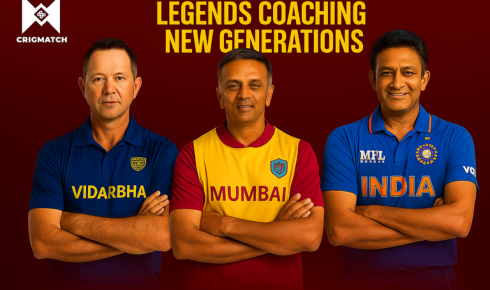Legends Coaching New Generations: Ponting, Dravid, Kumble

In cricket, legends are often remembered for their iconic performances on the field—their centuries, wickets, and match-winning moments. But many greats continue to shape the game long after retirement, stepping into coaching roles where they guide the next generation. Ricky Ponting, Rahul Dravid, and Anil Kumble are three such stalwarts who have transitioned seamlessly from being players to mentors, leaving a lasting impact on modern cricket.
Ricky Ponting – The Tactical Mentor
Ricky Ponting, one of Australia’s most successful captains, carried his sharp cricketing mind into the world of coaching. Known for his aggressive yet calculated leadership style, Ponting has become a sought-after coach in franchise leagues and an influential figure in shaping younger players’ careers.
Key Contributions
- Franchise Success: Ponting has been associated with top T20 franchises, where his tactical awareness and calm presence have earned him respect from international players.
- Guiding Young Talent: He is particularly skilled at instilling self-belief in youngsters, helping them adapt to high-pressure situations.
- Strategic Vision: His ability to analyze opposition and implement strategies makes him one of the most admired modern coaches.
Ponting’s legacy as a coach lies in translating his leadership traits into actionable lessons, preparing players not just for matches but for long-term careers.
Rahul Dravid – The Teacher of Discipline
If Ponting is known for his tactical acumen, Rahul Dravid is celebrated for his patience and mentorship. Nicknamed “The Wall” for his resilience as a batter, Dravid carried the same qualities into his coaching journey.
Key Contributions
- Nurturing India’s Next Generation: Before taking over as India’s head coach, Dravid led the National Cricket Academy and the India U-19 setup, where he groomed players like Shubman Gill, Prithvi Shaw, and Rishabh Pant.
- Emphasis on Character: Dravid’s philosophy goes beyond cricketing skills. He emphasizes humility, work ethic, and discipline—values that prepare players for challenges on and off the field.
- Calm Leadership: His measured approach allows players to grow without the fear of failure, creating an environment of trust and learning.
Dravid’s greatest contribution may not just be the matches he helps India win but the culture of professionalism and balance he instills in his teams.
Anil Kumble – The Strategist with Authority
Anil Kumble, India’s highest wicket-taker in Tests, is another legend who transitioned into coaching with authority and vision. Known for his never-say-die attitude as a player, Kumble has carried the same intensity into his coaching roles.
Key Contributions
- Analytical Approach: With a sharp mind for strategy, Kumble emphasizes preparation and adaptability.
- Leadership Experience: As a former captain, he understands the balance between managing senior players and guiding youngsters.
- Mentorship in Leagues and National Teams: Kumble has coached at both international and franchise levels, bringing structure and discipline to his squads.
Kumble’s style combines authority with guidance, ensuring that teams respect his experience while benefiting from his mentorship.
Shared Traits of These Legends
Despite their different personalities, Ponting, Dravid, and Kumble share qualities that make them exceptional mentors:
- Experience Under Pressure: Having played at the highest level, they know how to handle crunch moments.
- Focus on Team Culture: Each places importance on building strong, cohesive units.
- Player-Centric Approach: They adapt coaching styles to suit the strengths and weaknesses of individuals.
- Long-Term Vision: Beyond immediate victories, they prepare players for sustainable careers.
These traits underline why former legends are often the best mentors—they bring authenticity and credibility that younger players look up to.
The Impact on Modern Cricket
The influence of legends coaching new generations is visible in several ways:
- Better Prepared Youngsters: Players coming into international cricket now arrive with greater maturity and professionalism.
- Global Standards: Exposure to legends ensures that training, strategy, and mindset match the best in the world.
- Confidence in Big Matches: Mentorship from icons like Ponting, Dravid, and Kumble equips players with psychological resilience.
- Cross-Cultural Learning: Since many legends coach in international leagues, they help bridge gaps between cricketing cultures.
Their presence ensures that the game continues to evolve, blending traditional wisdom with modern techniques.
Challenges of Being a Legend-Coach
Coaching is not without its challenges, even for icons.
- Managing Expectations: Players and fans often expect immediate success, overlooking the long-term nature of coaching.
- Balancing Authority and Freedom: Legendary status can intimidate younger players, requiring careful balance to foster open communication.
- Modern Demands: Today’s game requires adapting to technology, data analytics, and evolving formats.
Despite these hurdles, Ponting, Dravid, and Kumble have shown that their adaptability is as strong as their cricketing achievements.
Final Thoughts
Ricky Ponting, Rahul Dravid, and Anil Kumble symbolize how legends can continue shaping cricket long after their playing days. They are not just coaches; they are custodians of values—discipline, resilience, and strategy—that define cricket at its best. Their work ensures that the next generation doesn’t just inherit a sport but also a culture built on respect and excellence.
For fans wanting to follow coaching insights, player development, and behind-the-scenes stories, the Cricmatch247 Register and Cricmatch247 Signup gateways offer dedicated updates and coverage of cricket’s evolving landscape.



